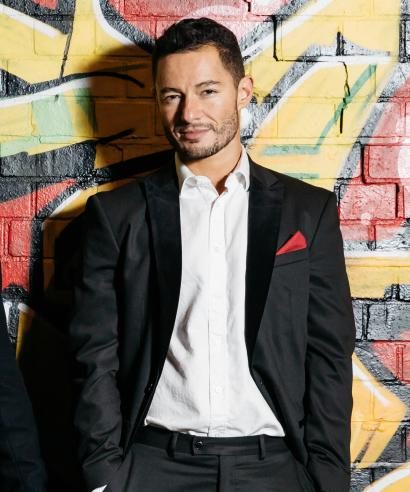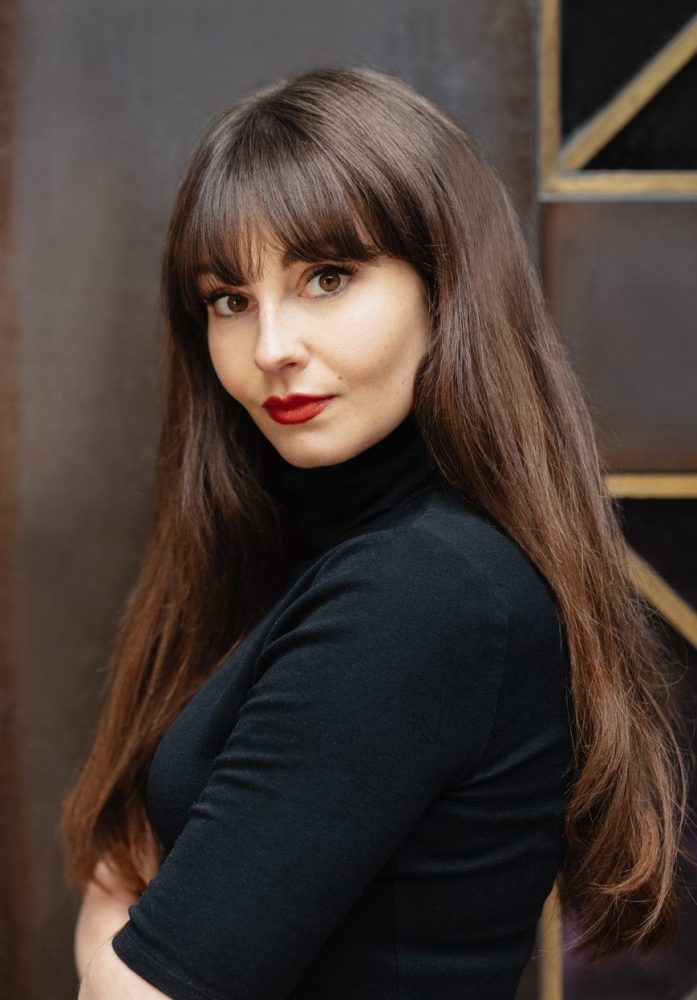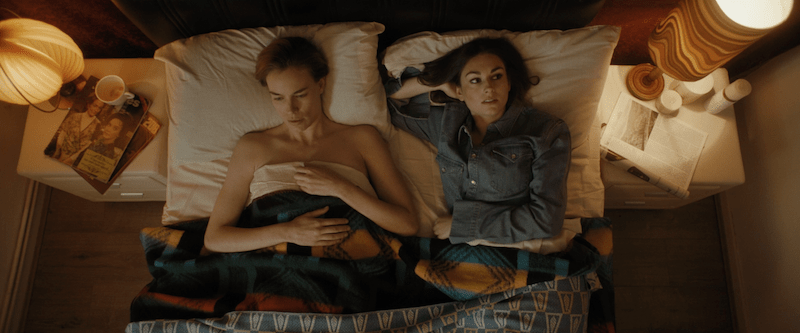Jake Graf and Victoria Emslie talk to Carrie Lyell about award-winning short, Dusk
Dusk is an award-winning short film about the life of a trans man called Chris, played by actor and model Elliott Sailors.
But we wanted to know more about the film, so we caught up with writer and director Jake Graf, and Victoria Emslie (The Theory Of Everything, The Danish Girl) who plays Julie, to find out what they had to say.
.png) Jake, tell us about Dusk.
Jake, tell us about Dusk.
Dusk is my latest movie, starring the amazing Elliott Sailors and Victoria Emslie, in what must surely be one of the most beautiful on-screen couplings of all time!
It’s a short film about the life of a trans man from age two to 70, starting in 1950s England. Unable to transition due to lack of medical help and information, “Chris” lives his life as a lesbian, in what most perceive to be a same-sex relationship, and the film examines how his choices affect the outcome of his life.
The inspiration for the film came last year when I received an email from a festival programmer in Canada. They told me that although they had lived their life as a man, they had always known that they were a woman, and despite much heartache over the years had chosen to accept their lot in life.
Now aged 70, they told me that they were basically happy, but had simply needed someone to know who they really were. The email stayed with me, and made me start to think of all the thousands, if not millions of trans folk who had never had the chance to live as themselves, and how devastating that must have been.

How much of the film is autobiographical?
Jake: The film’s lead, Chris, has a childhood which very much echoes mine, and much of Chris’ behaviour mirrors the way I acted as a child: perceived as female, I knew that I was in the “wrong body” from the age of three, and used the boys’ toilets at school, got bullied for looking like a boy, and frequently found myself in trouble with my parents and teachers alike just for being myself.
Back then teachers just didn’t know what to do with what they perceived as my “deviant” behaviour, and so just punished or excluded me rather than trying to help.
Then as I hit my teens the term “hermaphrodyke” became a favourite. Kids can be cruel, but certainly creative!
Victoria, tell us about your character.
Julie is a carefree, spirited, compassionate young woman who is empowered by her love for Chris and who is not afraid to stand up for what she believes in.
What was it about this project that spoke to you?
Victoria: Jake and I met on the set of The Danish Girl and we knew from the get-go that we wanted to work together. When he sent me through the script there were many aspects of Julie’s character which I identified with, which was lucky as he wrote her with me in mind!
Coming from a predominantly period drama background, I was very excited to explore these themes against a 1970s backdrop.
However, taken out of this temporal context, as we were filming I became very aware of the magnitude of the story which we were telling; it is still very much relevant today and there were definitely a few moments which were especially hard-hitting.
Jake, you’ve signed up some brilliant talent. Talk us through the casting process.
One of the perks of writing and directing independently is that I have final say over who we cast, as we’re not tied to a studio’s demands. I had been fortunate enough to work with Elliott and Victoria before in an acting capacity, with Elliott on web series Spectrum, and with Victoria on The Danish Girl, and knew from seeing them in action that they would be perfect.
Duncan was introduced to me at the British LGBT Awards, shortly before he joined Hollyoaks, and wanted to work with me having seen my last film, Dawn. Duncan is such a pro that working with him was too good an offer to refuse!
It was a huge joy being able to cast Duncan and Elliott as both are out, proud and visible members of the LGBT community, and I felt that that was particularly important for the film. I was also able to cast trans actors in both trans and cisgender roles: Elijah Harris plays the homophobic thug, Harry Bryant plays 16-year-old Chris, and my girlfriend, Captain Hannah Winterbourne of the British Army, pops up in a cameo in the bar scene.
It’s a rare privilege for a director to work with such an inclusive and diverse crew, and a great honour to direct such amazing and talented queer actors.

Victoria, what do you think Chris and Julie’s relationship can teach us about love and the human condition?
Loving yourself and those who are important to you should be at our very core. Acceptance of our strengths and weaknesses in the knowledge that what you find ugly about yourself might be the very thing which people love about you. Love as you wish to be loved, and understand that putting labels on others or yourself is not useful to anyone.
We are but atoms vibrating at different frequencies and not so different from one another. You can’t change the world, but you can change yourself for the better, and like dominos (not pizza) this change might have a positive knock-on affect on others.
How was working with Elliott Sailors?
Victoria: Elliott is a wonderfully generous performer and gives 110% to everything she does; I felt very comfortable being vulnerable in our scenes which I think helped led us to telling this story as honestly as possible.
Has Dusk taught you anything about yourself?
Victoria: I don’t think I have ever had so much fun on a set before; we had an incredible team working on every aspect of the shoot. We worked long hours, and the scenes were emotionally draining.
The story opened my eyes to encounters which I had not come into contact with before and even though some were not the most pleasant experiences to go through, I was very grateful to have been a part of this journey.
Jake, you act as well as write and direct. Was there a reason you chose not to appear in Dusk?
Dusk is my biggest and most ambitious film so far: a cast of 32, at least 10 big locations, eight children in various scenes across the film, a period piece spanning seven decades, and the added challenge of making Chris’ physical evolution over 70 years believable.
Other than the fact that there wasn’t really a part that I was suited for, the pre-production and shoot were challenging enough without the extra stress of being in front of the camera.
Dusk has had a fantastic reception so far, winning several awards. How important is that kind of recognition for you as a filmmaker?
Jake: Any kind of recognition is gratefully received, not only because it puts the film on festivals’ radar and earns us more selections, but also because it reminds me that whilst I may not be making any money from the films so far, they are making a difference in people’s lives.
Dusk has just won its seventh Best Short Film award, and for a team of largely fresh, novice actors, it’s been great to see the enthusiasm and excitement that that has created.
Having now made six short films, all of which are still screened regularly across the world, it’s time to get going on my first feature, so hopefully the back catalogue will serve as my calling card, and funding won’t be quite as elusive! I’m extremely lucky in that I’ve been on set with Oscar-winning directors, watching their every move, and while I’m still worlds away from that, I’d like to hope that I’ve picked up some good habits to stand me in good stead to direct this next one.
We’re seeing more nuanced trans stories on our screens, but there still aren’t nearly enough. What story would you like to see or tell?
Jake: When you think how diverse the trans community is, the possibilities are truly endless. Trans folk come from all classes, all cultures, all demographics, and unlike the gay community, we don’t even necessarily have a shared sexuality. What I find particularly interesting are stories of trans love and relationships.
As a trans man in a relationship with a trans woman, I have had my eyes opened to the many highs, lows, trials and tribulations that come with dating someone trans, and understand a little more now how tricky some situations may be for a cisgender partner to handle. I think that many trans people are told and feel that they don’t deserve love, and so I aim to show that’s not the case, and that there is hope for us all.
Personally though, I think that trans men need to see more of the limelight, and the feature film will be going a little deeper into that side of things!
What do you hope audiences will take away from Dusk?
Victoria: I hope that if anyone finds themselves in the same situation as our main characters that they can find a good support network around them. People will always try to change what they don’t understand, but as long as you stay true to yourself and are kind to others that is all one could hope for to have a happy life.
Jake: I would like to think that most people watching the film will have been able to come out and live their lives happily and visibly, particularly as we are screening at predominantly queer festivals.
For those audiences who may not be so familiar with the trans or queer experience, it would be lovely if the film gave them a little more understanding of what we often go through just to be ourselves. Another good take away would be to realise that whilst progress has been made since Chris’ day, there is still much work to do as a community and as a society. Oh, and that sometimes just being loved can be enough!
